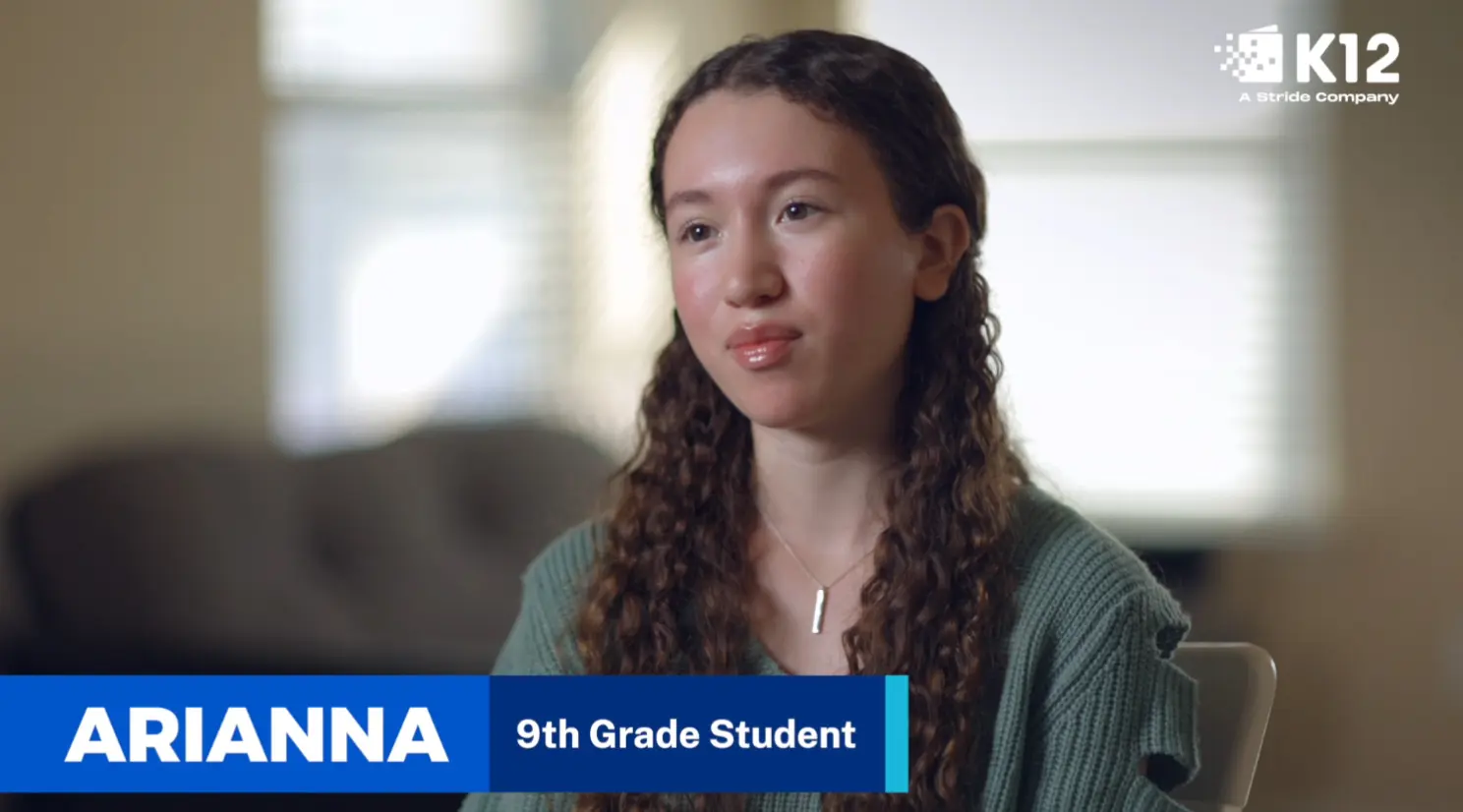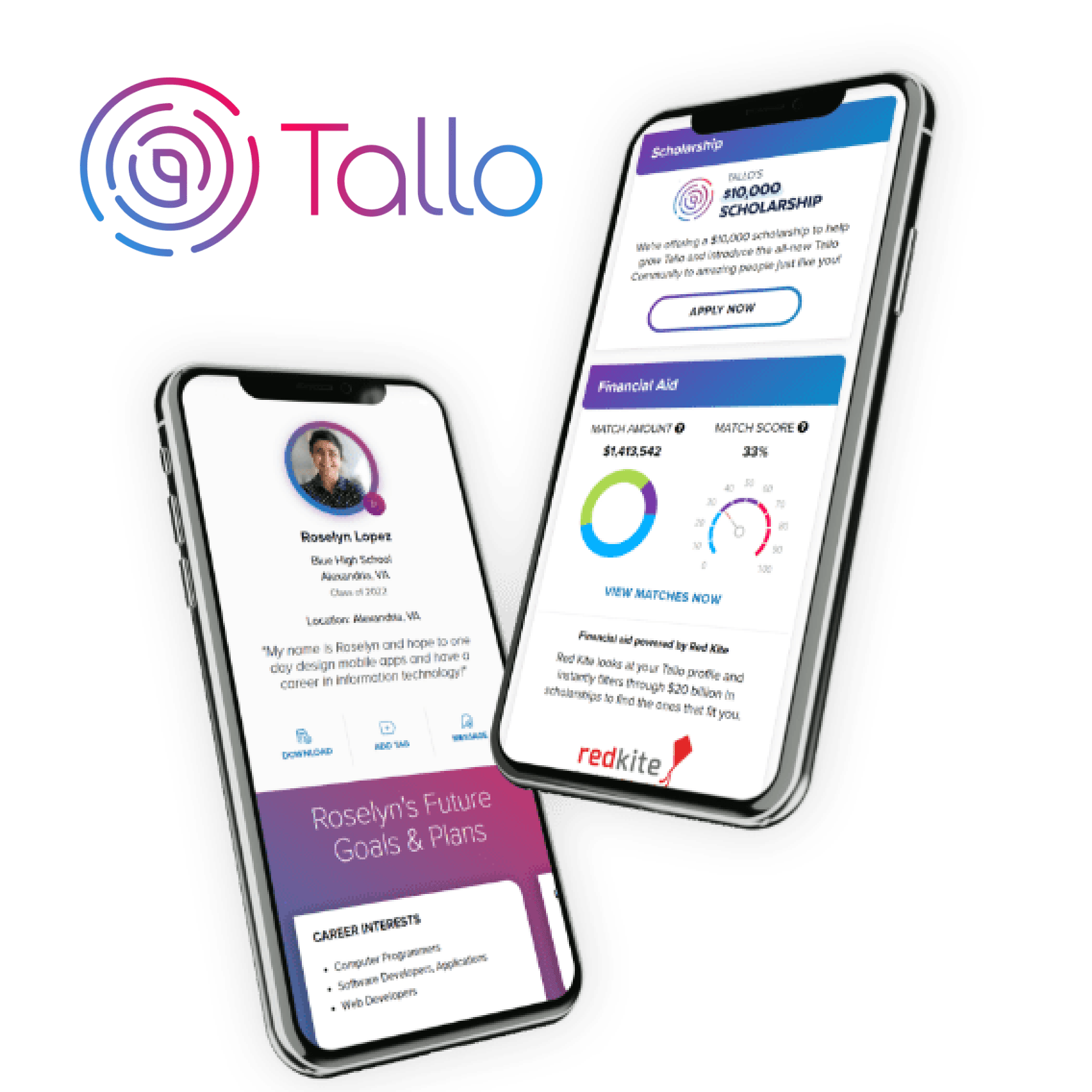Entrepreneurship Career Pathway
Supporting Today’s High School Student Entrepreneurs: From Passion Project and Side Hustle to Impact
The old definition of what it means to be an entrepreneur—an aggressive “start-up” mentality, taking on great personal and financial risk, and scaling only for profit—no longer applies. Today’s student entrepreneurs focus on creativity, collaboration, and passion, along with earning money, having the flexibility to be their own boss, and making an impact on the world.
The Stride Career Prep Entrepreneurship Pathway supports high school students through all stages of their journey—from exploring entrepreneurial concepts to gaining deeper insights for a well-rounded business background. Project-based learning helps students build skills that directly translate to today’s entrepreneurial world.
Stand Out from the Crowd
High school student entrepreneurs learn skills that employers value and help them stand out when applying for internships and jobs including:
Communication
Problem solving
Teamwork
Leadership
Organization
Strong work ethic
Meet Arianna
She’s a 9th grade Stride Career Prep student studying entrepreneurship online and applying what she learns to grow her bakery business. See how Stride Career Prep is preparing her for the future.
Gain real-world skills through project-based learning.
Stride Career Prep has implemented project-based learning (PBL) for many of the courses in this pathway. PBL curriculum is designed to give your student the practical skills they need to be an entrepreneur by honing their problem-solving, communication, critical thinking, and team collaboration skills. Our experienced teachers guide them through developing a marketing plan for a small business. Students in this pathway gain the knowledge, skills, experience, and confidence necessary to start a new venture or business right after graduation—or maybe even while still in high school.
Our Entrepreneurship Curriculum in Detail
All of our students take the core courses required for high school graduation in their state. The chart below shows the additional classes your student will take as an Entrepreneurship Pathway student. You can see the rest of the curriculum by viewing the full course list.
CAREER EXPLORATION COURSES
These courses provide an opportunity for students to gain insight into potential careers.
CAREER FOUNDATION COURSES
These courses are building blocks that prepare students for more specialized pathway courses.
CAREER PREPARATION COURSES
These courses prepare students for industry-recognized certification exams.
OPTIONAL CAREER LEARNING COURSES
While not required, these courses provide an opportunity for students to gain knowledge and skills that are useful in their chosen careers.
Business & Marketing Explorations
Intro to Business Information Management
Business Information Management: Data Essentials
Entrepreneurship 1
Entrepreneurship 2
Business Ownership 1†
Business Ownership 2 †
Accounting 1
Accounting 2
Introduction to Management 1
Management: Insight & Oversight
International Business
Note: Pathway courses are subject to change.
†New in fall 2022
Build Industry Knowledge—and Your Reputation—with Certifications
Earning industry certifications is one of the best investments students can make in their future. It signals to employers, internship providers, and colleges that a student has demonstrated specialized industry knowledge, skills, and dedication. The Entrepreneurship Pathway curriculum prepares students to take these industry-recognized certification exams:**
CAREER SKILLS CERTIFICATIONS
These baseline certifications indicate students have mastered domain-specific, entry-level job skills.
EMPLOYMENT READY CERTIFICATIONS
These certifications indicate students have acquired skills needed to perform a job with little or no support.
A*S*K Concepts of Entrepreneurship
A*S*K Fundamental Business Concepts
Certiport Entrepreneurship & Small Business Management
We Help Students Build Their Brand and Get Connected
We connect students with Tallo to help them build a professional online profile that:
- Showcases their interests and accomplishments
- Helps them apply to internships and jobs
- Matches them to scholarships
- Connects them with colleges and companies looking for talent
Plus, our teachers use Nepris in their online classrooms to bring real-world learning, curriculum, and industry speakers directly to students. This approach helps to engage and inspire growing entrepreneurs with their next great idea, career topic, and more.
Find a school near you that offers Entrepreneurship.
Stride Career Prep programs with the Entrepreneurship pathway are available at tuition-free, K12-powered, fully accredited, public online schools in the following states:
Don’t see your state? Check out the tuition-based option here in the Entrepreneurship Pathway. There are also tuition-free options in related fields like the Business Finance Pathway!
How We Support High School Student Entrepreneurs
We’re passionate about helping high school students nationwide in their entrepreneurial pursuits—whether they’re doing side jobs, using their skills to help an existing business, or solving a problem by starting or growing their own business. Students can:
- Access our High School Student Entrepreneur Resource Center for free content, tips, and templates, and find inspiration from other student entrepreneurs.
- Download The GenZ Entrepreneurship Guide—a helpful list of advice for high school students who are considering starting or running a business.
- Meet with a Student Success Coach. Stride Career Prep Students get access to virtual group or one-to-one coaching sessions to help them create a résumé, discover their interests, and create a plan for high school and beyond.
Choose a career. Prepare for the future.
Whether students are gaining experience from side jobs or forging their own paths, below are just a few examples of entrepreneurial careers using the skills they’ve learned.
Insurance sales agents contact potential customers and sell one or more types of insurance. Insurance sales agents explain various insurance policies and help clients choose plans that suit their needs.
2021 Median Salary
$49,840
Expected Job Growth Rate for 2020–2030
Average
Typical Entry-Level Education
High school diploma or GED; insurance agents must also be licensed in the state in which they practice
This data reflects the information available from the Bureau of Labor Statistics, U.S. Department of Labor, Occupational Outlook Handbook on February 9, 2021. To learn more about this occupation, visit bls.gov/ooh/sales/insurance-sales-agents.htm.
Real estate agents help clients buy, sell, and rent properties. Real estate agents may specialize in commercial or residential real estate, and in working with buyers or sellers. When working with sellers, real estate agents handle all aspects of listing the property, recommend repairs and upgrades, recommend a listing price, advertise through direct mail campaigns and magazine and newspaper ads, hold open houses, and assist the seller in negotiating and closing a deal. When working with buyers, real estate agents identify suitable properties, accompany buyers on property visits, and assist in putting together an offer, negotiating a final contract, and closing the sale. Most agents are self-employed, although many are affiliated with (though not employed by) a real estate brokerage firm (e.g., Long and Foster).
2021 Median Salary
$48,770
Expected Job Growth Rate for 2020–2030
Average
High school diploma or GED; insurance agents must also be licensed in the state in which they practice
Bachelor’s degree
This data reflects the information available from the Bureau of Labor Statistics, U.S. Department of Labor, Occupational Outlook Handbook on July 1, 2022. To learn more about this occupation, visit bls.gov/ooh/sales/real-estate-brokers-and-sales-agents.htm.
Small businesses are generally defined as employing fewer than 500 employees, though many small businesses employ no one at all other than the owner. Small business owners range from owners of retail businesses, like bakeries, bike shops, and restaurants; to self-employed childcare providers, web developers, and consultants; to landscaping and construction businesses. No matter their specialty, they must oversee all aspects of their business, from marketing and sales to accounting and tax reporting—and, of course, they must ensure they turn a profit.
2021 Median Salary
Varies
Expected Job Growth Rate for 2020–2030
Data not available
Typical Entry-Level Education
High school diploma or GED, and significant expertise (and often required licenses) in the industry the individual is entering.
This data reflects the information available from the Bureau of Labor Statistics, U.S. Department of Labor, Occupational Outlook Handbook on July 1, 2022. To learn more about this occupation, visit bls.gov/careeroutlook/2014/article/self-employment-what-to-know-to-be-your-own-boss.htm.
Writers and authors develop written content for various types of media. They can work anywhere they have access to a computer, and many are self-employed.
2021 Median Salary
$69,510
Expected Job Growth Rate for 2020–2030
Average
Typical Entry-Level Education
Bachelor’s degree
This data reflects the information available from the Bureau of Labor Statistics, U.S. Department of Labor, Occupational Outlook Handbook on July 1, 2022. To learn more about this occupation, visit www.bls.gov/ooh/media-and-communication/writers-and-authors.htm.
Personal financial advisors provide advice to help individuals manage their money and plan for their financial future. Most personal financial advisors work in the finance and insurance industry or are self-employed. They typically work full-time, and some work more than 40 hours per week. They also may meet with clients in the evenings or on weekends.
2021 Median Salary
$94,170
Expected Job Growth Rate for 2020–2030
Slower than average
Typical Entry-Level Education
Bachelor’s degree; a master’s degree and certification may improve chances for advancement.
This data reflects the information available from the Bureau of Labor Statistics, U.S. Department of Labor, Occupational Outlook Handbook on July 1, 2022. To learn more about this occupation, visit bls.gov/ooh/business-and-financial/personal-financial-advisors.htm.
FAQs
The old definition of what it means to be an entrepreneur—an aggressive “start-up” mentality, taking on great personal and financial risk, and scaling only for profit—no longer applies. Today’s student entrepreneurs focus on creativity, collaboration, and passion, along with earning money, having the flexibility to be their own boss, and making an impact on the world. The truth is that entrepreneurs are just as diverse—in terms of age, gender, race, ethnicity, and background—as the businesses they run. They might start a bakery, a martial arts studio, or a party planning business. They might invent and market shapewear (Sara Blakely), found a website that helps parents of special needs children connect with each other (Sehreen Noor Ali), or start a new fitness craze like Zumba (Alberto Perez). What all entrepreneurs have in common is a can-do attitude, a high tolerance for risk, the ability to multitask, and a laser-like focus on the customer and the product. They also know that success doesn’t happen overnight and is really the result of careful planning and masterful execution. We took this into account when designing the Entrepreneurship pathway. Our entrepreneurship classes are practical, hands-on, and require each student to develop a real business plan. We wrap this into a unique project-based learning curriculum that emphasizes critical thinking, communication, and teamwork.
The benefits of being an entrepreneur can be varied and extensive, including having a flexible schedule, building your personal brand, feeling that you’re making an impact, earning income in high school, gaining skills and experience, exploring careers, and being your own boss.
High school students are doing everything from side-jobs, where they use their current skills to help other businesses, to launching organizations and non-profits to help solve a problem. All these things translate into being an entrepreneur. It’s also about understanding how the skills students are learning are critical to their next step after graduation, whether they plan to explore careers, internships, or college. Today’s entrepreneurs can be classified into the following categories: Contractors—filling needs with local jobs and tasks to gain experience and income: personal driver/taxi, tutoring, photography, dog-walker, babysitter, baker, lawncare, house-sitting pet-sitting, and more. Side-Hustle or Passion Project—using skills and interests to help another business or consumers: coding, website or app development; social media Influencer, personal trainer; graphic designer; online sales, and more. The Start-Up that Solves a Problem or Pursues Innovation: These start by identifying a problem and the new technology you can create or adapt that will solve it. Start-ups often require a business plan, marketing, branding, funding needs, mentoring, and more.
The first step in starting your own small business is to know what you are going to sell and to whom.
High school student entrepreneurs learn skills that employers value, including communication, problem-solving, teamwork, leadership, organization, and a strong worth ethic—all demonstrated qualifications that help them stand out when applying for internships and jobs.
The Entrepreneurship Pathway is excellent preparation for a career as a small business owner or entrepreneur. Your student will take two full semesters of hands-on training in entrepreneurship, and our experienced teachers will guide them through developing their own business plans. We wrap this into a unique project-based learning curriculum that emphasizes critical thinking, communication, and teamwork. Budding entrepreneurs can take classes in accounting, finance, entrepreneurship, computer literacy, and other business courses while still in high school. They can also join student clubs for aspiring business leaders, take on leadership positions in student clubs, spearhead new initiatives and fundraising campaigns, participate in business case competitions, shadow entrepreneurs, and offer to volunteer or work for an entrepreneur or local small business. There’s no substitute for getting an insider’s view into the world of entrepreneurship!
*Stride Career Prep is a program for grades 9–12. Some schools offer career exploration in middle school.
**Many Microsoft®️ Office certificates can be earned after completing one course. Other certificates require more classes to be better prepared, and students who participate in the program for at least two years will have further preparation for certification testing.
***Opportunities vary by school; please visit your school page or check with your school counselor.















